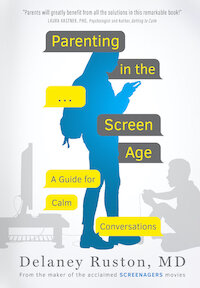
People often ask me how much screen time is healthy. That’s a hard one because each family is different and what I hope for is that parents can help kids find balance with all this screen time. Recently I ran into Dimitri Christakis, MD, who is in Screenagers and is very involved in helping to formulate the American Academy of Pediatrics’ (AAP) guidelines on screen time and kids, and he said the AAP are working hard to come up with something that is balanced, doable and data driven knowing how pervasive screens are in our culture.
Recently, the AAP released an article published in the AAP News with a preliminary outline of where the recommendations are headed. This first update since the guidelines were created in 1999 is titled “Beyond ‘turn it off’: How to advise families on media use," and contains the following:
“In a world where ‘screen time’ is becoming simply ‘time,’ our policies must evolve or become obsolete. The public needs to know that the Academy’s advice is science-driven, not based merely on the precautionary principle.”
The new guidelines are expected to be released in October 2016. In a recent NPR interview, David Hill, MD and chairman of the AAP Council on Communications and Media, offered some insights what’s behind the AAP’s thinking.
“The question before us is whether electronic media use in children is more akin to diet or to tobacco use,” explains Dr. Hill. “With diet, harm reduction measures seem to be turning the tide of the obesity epidemic. With tobacco, on the other hand, there really is no safe level of exposure at any age. My personal opinion is that the diet analogy will end up being more apt."
“While we acknowledged that mobile and interactive screens have become ubiquitous in children's lives, we did not advocate for their wholesale adoption,” expands Dr. Hill. “I suspect that when they do come out, the statements will be highly conservative, reinforcing much of what we have said in the past about the known effects of electronic media use on child health and development.”
Elements of the Coming Guidelines
In the meantime, here is a subset of the “messages” published in the October 2015 issue of AAP News from the AAP’s May 2015 conference:
Here is a video from the Screenagers YouTube Channel that talks more about this subject

People often ask me how much screen time is healthy. That’s a hard one because each family is different and what I hope for is that parents can help kids find balance with all this screen time. Recently I ran into Dimitri Christakis, MD, who is in Screenagers and is very involved in helping to formulate the American Academy of Pediatrics’ (AAP) guidelines on screen time and kids, and he said the AAP are working hard to come up with something that is balanced, doable and data driven knowing how pervasive screens are in our culture.
Recently, the AAP released an article published in the AAP News with a preliminary outline of where the recommendations are headed. This first update since the guidelines were created in 1999 is titled “Beyond ‘turn it off’: How to advise families on media use," and contains the following:
“In a world where ‘screen time’ is becoming simply ‘time,’ our policies must evolve or become obsolete. The public needs to know that the Academy’s advice is science-driven, not based merely on the precautionary principle.”
The new guidelines are expected to be released in October 2016. In a recent NPR interview, David Hill, MD and chairman of the AAP Council on Communications and Media, offered some insights what’s behind the AAP’s thinking.
“The question before us is whether electronic media use in children is more akin to diet or to tobacco use,” explains Dr. Hill. “With diet, harm reduction measures seem to be turning the tide of the obesity epidemic. With tobacco, on the other hand, there really is no safe level of exposure at any age. My personal opinion is that the diet analogy will end up being more apt."
“While we acknowledged that mobile and interactive screens have become ubiquitous in children's lives, we did not advocate for their wholesale adoption,” expands Dr. Hill. “I suspect that when they do come out, the statements will be highly conservative, reinforcing much of what we have said in the past about the known effects of electronic media use on child health and development.”
Elements of the Coming Guidelines
In the meantime, here is a subset of the “messages” published in the October 2015 issue of AAP News from the AAP’s May 2015 conference:
Here is a video from the Screenagers YouTube Channel that talks more about this subject

Did you know that 45% of girls stop playing sports by age 14 due to low body confidence? That is a shocking and devastating statistic. Dove's Super Bowl ad, in partnership with Nike highlighted this, presenting a critical conversation starter about the intersection of self-esteem, body image, and performance in societal contexts. This 30-second spot was shown to an audience of 123.4 million, as part of Dove’s “The Self-Esteem Project” In a world where what girls see on social media, influencers on YouTube on their favorite shows, and in advertising powerfully shape perceptions and behaviors, this was an important moment. Read more and see the ad in today’s blog.
READ MORE >
For me, Valentine’s Day (which is, by the way, one of my top holidays) is about communicating our love and appreciation for people we care about — not just those we may be romantically involved with. Emojis are all about communicating and we all have different emoji-use styles — from complete nonuse to the most curated and abundant use. What are you? What is your child? And why is it even worth asking?
READ MORE >
As a physician and the creator of the "Screenagers" movies, I've always been fascinated by the intricacies of adolescent decision-making. Through the Screenagers podcast, I've had the opportunity to delve deep into this topic, and in a podcast episode I just released yesterday, I share some of those insights with you. I invite you to listen to the Podcast, but if you prefer to read, click here for a summary of the podcast.
READ MORE >for more like this, DR. DELANEY RUSTON'S NEW BOOK, PARENTING IN THE SCREEN AGE, IS THE DEFINITIVE GUIDE FOR TODAY’S PARENTS. WITH INSIGHTS ON SCREEN TIME FROM RESEARCHERS, INPUT FROM KIDS & TEENS, THIS BOOK IS PACKED WITH SOLUTIONS FOR HOW TO START AND SUSTAIN PRODUCTIVE FAMILY TALKS ABOUT TECHNOLOGY AND IT’S IMPACT ON OUR MENTAL WELLBEING.
